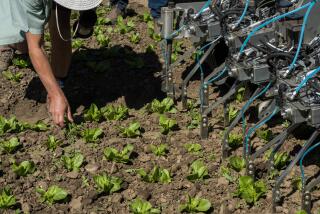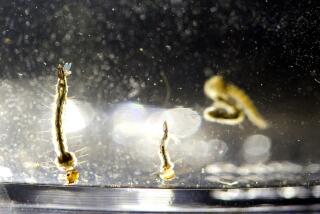Dow Chemical Signs 2 More Pacts in Biotechnology Push
- Share via
Dow Chemical Co. is a venerable giant in the crucial but dull chemicals industry, and one look at Dow’s laggard stock points up how chemicals and the returns they generate are very cyclical.
That’s why Dow, the company that brings you Styrofoam, took another step Tuesday to ease away from its basic chemical lines--and their erratic cycles--and toward the sexier, fast-growing field of biotechnology to boost the production, safety and efficiency of agricultural crops.
Dow formed research and marketing alliances with two more companies in the field of genetically altered crops and seeds: Biosource Technologies Inc. of Vacaville, Calif., and Illinois Foundation Seeds Inc. of Champaign, Ill.
Dow, based in Midland, Mich., already is involved in genetically engineered crops through some existing ventures such as its majority ownership of Mycogen Corp. of San Diego. And Dow’s chief executive, William Stavropoulos, has said biotechnology is “an essential growth platform for Dow” and a way for the company to post more consistent profit gains.
But Dow is playing catch-up with its major rivals. DuPont Co. and Monsanto Co. together have spent nearly $10 billion investing in crop and seed companies that are experimenting with biotechnology to improve their results.
Dow “needed more ammunition to be a competitor in the world of agricultural biotechnology,” said analyst Theodore Semegran of the investment firm Brown Bros., Harriman & Co. in New York.
Yet the deals announced Tuesday are only “another step” and not “the final outcome” in Dow’s push toward biotechnology, a situation evident in the cautious way that investors greeted the new alliances, he said.
While that other Dow--the Dow Jones industrial average--and the rest of the stock market were soaring, Dow Chemical added just 50 cents, to $80 a share, in New York Stock Exchange composite trading.
That’s not new: Dow’s stock has lagged the market for some time. It’s currently trading not much above its highs of 1994, and in the last three years, the stock has gained a paltry 4%, compared with a 65% jump in DuPont’s stock, a 163% surge by Monsanto’s and a 70% gain in the bellwether Standard & Poor’s 500-stock index.
Wall Street’s excitement over the biotech investments by DuPont and Monsanto is one reason their stocks have far outpaced Dow Chemical’s. But Dow’s stagnant performance also is to blame.
The company’s annual sales have been flat at $20 billion for three years running, and its earnings haven’t been much better. Profit from continuing operations in 1997 was $1.8 billion, down 5% from two years earlier.
Slumping prices for many of its chemicals and plastics--which include ethylene, propylene, vinyl chloride and a host of other items used in manufacturing consumer and industrial products--are a big part of the problem. The U.S. dollar’s strength overseas and reduced sales to distressed Asia also are culprits.
It also hasn’t helped that Dow is a half-owner of Dow Corning Corp., which made the silicone breast implants that continue to be the subject of widespread health-related litigation. Though it’s had to pay legal costs for defending itself in thousands of lawsuits, Dow Chemical hasn’t yet paid any damages in those cases, said spokesman John Musser. (The other half-owner is Corning Inc.)
Dow even jettisoned a well-known stable of consumer products because they didn’t fit with its growth strategy. The group--with brands such as Ziploc plastic bags, Saran Wrap plastic film and Fantastik household cleaner--was sold early this year for $1.2 billion to S.C. Johnson & Son Inc., otherwise known as Johnson Wax.
Though Dow hasn’t yet invested as much as DuPont or Monsanto to expand into biotechnology, Stavropoulos defended his strategy, saying it wasn’t crucial that Dow spend as heavily at this stage.
“The person who was first in computers was not necessarily the one to survive,” he told Bloomberg News. “What we’re doing is stitching together a strategy that has legs.”
By linking with Biosource Technologies, Dow enhances its effort to find and patent new genes that can be used to produce new varieties of crops.
“This is exciting technology,” Nick Hein, a biotechnology vice president at Dow’s AgroSciences unit, said in a statement. “We can use it to look for a wide range of improvement in plants, from agronomic traits such as improving resistance to drought, to increasing production by finding traits such as increased insect and disease resistance.”
Illinois Foundation provides genetic material used to form new varieties of corn, and it will join with Dow to create a new company, called Advanced AgriTraits, which will act as a clearinghouse for other companies trying to develop and market new genes that enhance crops.
The alliances’ financial terms weren’t disclosed, although the companies said Dow would get a 10% stake in Illinois Foundation, which, in turn, would get a 16.4% interest in Advanced AgriTraits.
(BEGIN TEXT OF INFOBOX / INFOGRAPHIC)
Cash Crop
Dow Chemical unveiled new investments in crop biotechnology to keep pace with rivals DuPont and Monsanto, whose heavy biotech spending has helped boost their stocks in recent years. Quarterly closes and latest:
Dow Chemical
Tuesday: $80
*
Dupont
Tuesday: $57.19
*
Monsanto
Tuesday: $55.75
Source: Bloomberg News
More to Read
Inside the business of entertainment
The Wide Shot brings you news, analysis and insights on everything from streaming wars to production — and what it all means for the future.
You may occasionally receive promotional content from the Los Angeles Times.










